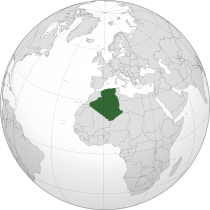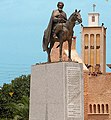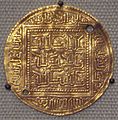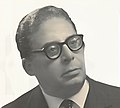Portal:Algeria
 The Algeria Portal
Algeria, officially the People's Democratic Republic of Algeria, is a country in the Maghreb region of North Africa. It is bordered to the northeast by Tunisia; to the east by Libya; to the southeast by Niger; to the southwest by Mali, Mauritania, and Western Sahara; to the west by Morocco; and to the north by the Mediterranean Sea. Algeria has a semi-arid climate, with the Sahara desert dominating most of the territory except for its fertile and mountainous north, where most of the population is concentrated. Spanning 2,381,741 square kilometres (919,595 sq mi), it is the world's tenth largest nation by area, and the largest nation in Africa. With a population of 44 million, Algeria is the tenth-most populous country in Africa, and the 32nd-most populous country in the world. The capital and largest city is Algiers, located in the far north on the Mediterranean coast. Algeria's official languages are Arabic and Tamazight; French is used in media, education, and certain administrative matters. The vast majority of the population speak the Algerian dialect of Arabic. Most Algerians are Arabs, with Berbers forming a sizeable minority. Sunni Islam is the official religion and practised by 99 percent of the population. (Full article...) Selected article -The Algerian War (also known as the Algerian Revolution or the Algerian War of Independence) was a major armed conflict between France and the Algerian National Liberation Front (FLN) from 1954 to 1962, which led to Algeria winning its independence from France. An important decolonization war, it was a complex conflict characterized by guerrilla warfare and war crimes. The conflict also became a civil war between the different communities and within the communities. The war took place mainly on the territory of Algeria, with repercussions in metropolitan France. Effectively started by members of the National Liberation Front (FLN) on 1 November 1954, during the Toussaint Rouge ("Red All Saints' Day"), the conflict led to serious political crises in France, causing the fall of the Fourth Republic (1946–58), to be replaced by the Fifth Republic with a strengthened presidency. The brutality of the methods employed by the French forces failed to win hearts and minds in Algeria, alienated support in metropolitan France, and discredited French prestige abroad. As the war dragged on, the French public slowly turned against it and many of France's key allies, including the United States, switched from supporting France to abstaining in the UN debate on Algeria. After major demonstrations in Algiers and several other cities in favor of independence (1960) and a United Nations resolution recognizing the right to independence, Charles de Gaulle, the first president of the Fifth Republic, decided to open a series of negotiations with the FLN. These concluded with the signing of the Évian Accords in March 1962. A referendum took place on 8 April 1962 and the French electorate approved the Évian Accords. The final result was 91% in favor of the ratification of this agreement and on 1 July, the Accords were subject to a second referendum in Algeria, where 99.72% voted for independence and just 0.28% against. (Full article...)General images -The following are images from various Algeria-related articles on Wikipedia.
Did you know
Selected biography -Omar Derdour (Arabic: عمر دردور), full name Abou El Kacem Omar Derdour (13 October 1913 – 19 March 2009), was an Algerian Muslim leader, nationalist, and political worker. A disciple of Abdelhamid Ben Badis, he was active in the Islamic reformation of Algeria and the Algerian War of Independence. He directed the Friends of the Manifesto and Liberty Party's (in French: Amis du Manifeste et de la Liberté, AML) Federation in Constantine, and was a member of the Central Committee and Deputy of the Constantine region from 1947 to 1951. (Full article...)
Selected cuisines, dishes and foods - Related portalsWikiProjects
{{{contents}}}
CategoriesSelect [►] to view subcategories
Things you can do
New articlesThis list was generated from these rules. Questions and feedback are always welcome! The search is being run daily with the most recent ~14 days of results. Note: Some articles may not be relevant to this project. Rules | Match log | Results page (for watching) | Last updated: 2024-05-20 20:01 (UTC) Note: The list display can now be customized by each user. See List display personalization for details.
Algeria topics
Associated WikimediaFind this theme on other projects coordinated by the Wikimedia Foundation, Wikipedia hosting provider:
| ||||||||||

































